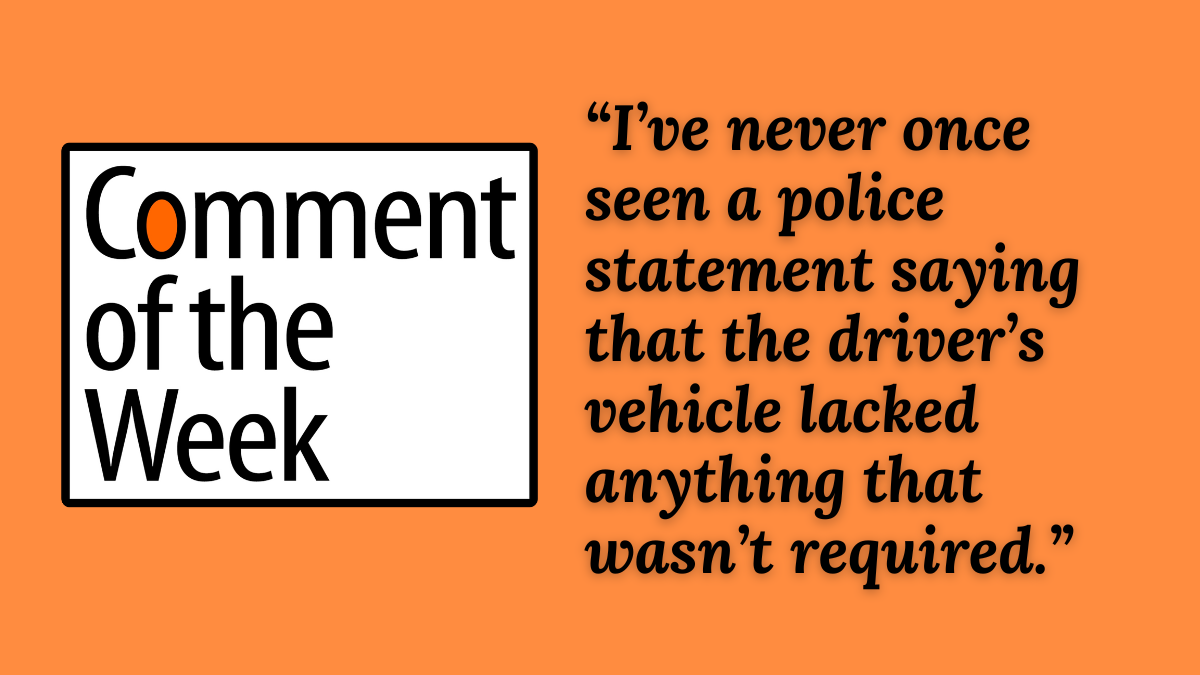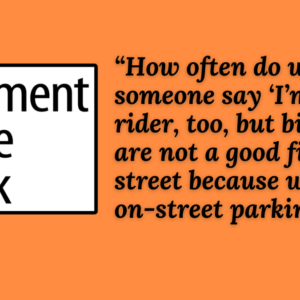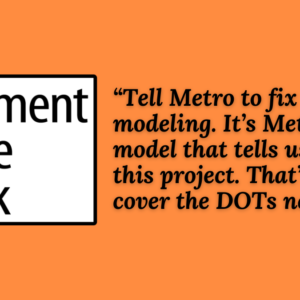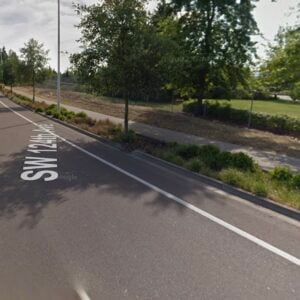
Welcome to the first Comment of the Week since former writer of this column, Lisa Caballero, bid us all adieu. And boy do I miss her help!
Y’all left 515 comments last week. While I do scan and/or read all of them prior to hitting “approve,” I’m not sure I can really digest entire threads and engage and interact with them to the extent they deserve. (Not sure if it’s clear to everyone reading this but BikePortland is essentially a one-person operation.) That being said, I will continue to try and I’m not ready to give up on COTW just yet.
Going forward, I’ll be even more reliant on your nominations. So pretty please, if you read a comment that you think is insightful, productive, smart, fresh, informative, provocative, etc., please reply with a comment that includes “comment of the week” or “COTW”. That way I can do a search for those terms on Monday morning and see all the best comments.
This week I’ve chosen a comment from qqq. It was in response to my opinion piece about one of the reasons the City of Portland is having a difficult time reducing traffic deaths. qqq was clearly annoyed at the police crash statement about a recent fatal collision on SE Division, where the Portland Police Bureau (once again) went out of their way to absolve the driver. Here’s the comment:
“… the next thing the police do regularly after saying the driver cooperated, etc. is say the pedestrian or cyclist victim was ‘wearing dark clothing’, ‘was not wearing hi-viz clothing’, ‘had no rear light’, ‘had no helmet’, etc. – all things that aren’t required by law, but that sound like they are because the police are pointing them out.
Yet I’ve never once seen a police statement saying that the driver’s vehicle lacked anything that wasn’t required: ‘The car lacked a backup camera, ABS brakes, traction control…’. I don’t think I’ve ever even seen a report mentioning a legal problem with the car, other than no license plate: “’The car’s headlight was burned out, the tires were bald, the windshield was darkly tinted, the mirror was missing, the side window was obstructed…’).”
And as we learned in this specific case, the driver on SE Division was indeed in the wrong and was cited for careless driving.
qqq makes an excellent and accurate point. It adds fuel to my idea that PPB should adopt a crash statement template; sort of like a Mad Lib-style form where they just fill in key facts and don’t make any subjective statements whatsoever.
Thanks to Fred for the nomination. And thanks for all the great comments last week.







Thanks for reading.
BikePortland has served this community with independent community journalism since 2005. We rely on subscriptions from readers like you to survive. Your financial support is vital in keeping this valuable resource alive and well.
Please subscribe today to strengthen and expand our work.
There’s a very good chance there’s already a form for traffic incidents with lots of objective-looking checkboxes and template fields, so your suggestion may already have been implemented, at least internally.
If your goal is to have the police only be able to recite words from a form-based template when asked about or commenting on a crash, I think that would end up being frustrating for everyone.
Watts,
I’ve proposed this idea to two PPB comms managers in the past years (I used to have a great relationship with PPB prior to 2020) and they both responded with a similar concern. “What would we tell media when folks ask us for details?” And I always found that sort of funny. I mean, it’s not PPB’s job to do journalism. If local media want to find out more, they can do journalism and figure it out. I’d rather have me and others be frustrated than have subjective, judgmental, biased and unfair language coming from such a powerful information source.
I remember that, and that relationship resulted in some fascinating articles where we could get a better understanding of perspectives that differ from our own. I never did understand why you chose to sever those connections.
Agreed*, though that’s not they were doing here. Nor was there much subjective information that could be filtered out with a formulaic approach, unless the template would not mention speeding [apparently not], impairment [not observed], or leaving the scene [no].
*There is a lot of overlap: journalists and the cops both conduct investigations and report what they find.
It was something that happened over time and it wasn’t a choice I made in isolation. The 2020 protests changed how I looked at policing and its role in our city. I got too far off course and I’m re-orienting myself now. I’m not opposed to having relationships at PPB, it just hasn’t happened. In those old days the PPB was just around transportation more. At meetings, in the community, and so on. That made my relationships easier and more natural. I think it’s reasonable for folks to be skeptical of PPB and like a lot of things in our society, there’s been a major loss of innocence so to speak and I’m not sure it will ever change to how it was before (probably not).
My idea for a template is just to state a few basic facts and then say, “PPB will not comment further until the investigation is complete.” That’s it.
The basic facts would be: Date, time, location, weather conditions, injury severity, type of vehicles involved.
I see. But when the investigation was complete, they could explain what they think happened?
Well once investigation is complete we could all see what happened based on the best available information. I don’t want police explaining anything unless they are asked to explain it.
I study the PPB news releases very carefully and they must already have a template, which looks something like this:
The single biggest improvement PPB could make to their news releases is eliminate the word “cooperating.” But I’m guessing they use it b/c they want to send a strong message that if you stop and talk with police and answer their questions, then your COOPERATION will benefit you. But if you don’t COOPERATE, then things will go badly for you – when in fact stopping and talking with police is a driver’s duty, under the law. It’s what every driver is REQUIRED to do, and shouldn’t receive any special call-out by police in their statements. It has the added effect of absolving the driver of responsibility for what happened – before any investigation has been completed – at least in the mind of anyone reading these statements.
JM is right: Police should state just the facts and let journalists do their own investigation and take the heat for whatever subjective comments they make about an incident. Right now police are making those subjective comments, which lazy news outlets can then hide behind.
bingo Fred!
“Cooperating,” which implies good will and honesty, could be replaced by “the driver was questioned (or interviewed) by the police.”
That also is much more accurate than cooperating in the cases where the driver is questioned by police and lies about everything–which certainly isn’t cooperating.
Basically, this comment comes down to asking police not to say whether a driver is cooperating or hindering an investigation, with just a hint of absolution for drivers who leave the scene of a crash.
Personally, I don’t mind the police creating the presumption that cooperation is beneficial, to the extent it doesn’t interfere with anyone’s legal rights. I want people to cooperate with police investigations.
That said, I don’t object to eliminating the word “cooperating” when speaking to the press if it really does influence the investigation.
love it!
When the PPB or PBOT talk about culture change, they mean everyone else.
COTW!
That’s funny, David!
But it’s so true! When I worked at PBOT (2000-2006) most of the planners and many of the engineers would talk about how Portland residents really need to change their behavior, how crazy they drive, and so on – nothing about themselves needing to change how they do things, their assumptions, nothing introspective – they would externalize everything, that all crashes were caused by reckless residents or visitors, never by bad stroadway design, poor signal timing, or wide lanes. The IT folks, who I would work next to me in my tiny cubicle, didn’t actually work for PBOT and would regularly roll their eyes and make jokes at the stuff they would hear. Mind you there were one or two conscientious introspective employees, but they were largely ignored.